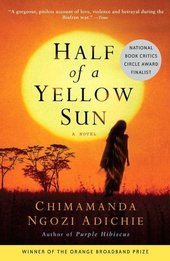
Author: Chimamanda Ngozi Adichie
Genre: Historical Fiction
# pages: 433
Date published: 2006
5-star rating: 4.5
Set in the West African country of Nigeria, Adichie’s novel focuses on a single event in Nigerian history: Biafra’s secession bid and the eastern part of the country’s eventual reabsorption into the country. The time frame oscillates between the early sixties and then a few years later at the end of the decade. We follow four main characters – Odenigbo, his lover Olanna, Olanna’s sister Kainene, and Kainene’s lover Richard – in the period leading up to the secession of Biafra, during the war between Nigeria and Biafra, and finally a brief era after Biafra is reclaimed into the country. Two of the tribes in the country, the Igbo and the Hausa come to a clash. There is widespread massacre of Igbo in the North, which functions as an impetus for the ultimate drive for rebellion. Some parts of the narrative are vivid and disconcerting, but they serve as excellent illustrations of the nature of the conflict. The book is long, but it is a really engaging and fast read. Adichie is a great writer and the story is gripping. The book contains a number of themes about fear and faith, the newness of modernity vs. maintaining tradition, the battle between power and identity, and love. I really loved trying to understand the different nuances present in the relationships of the couples, both Olanna and Odenigbo and Kainene and Richard. In a world that seems hopeless and virtually wretched, love seems to prevail in all of its complex forms. While very captivating, the novel ends on a disappointing and slightly depressing note, but I still found that there was a lot of valuable material to learn from it.
Review by Yande Lombe, A&S '14

 RSS Feed
RSS Feed
